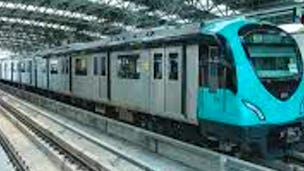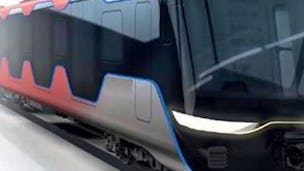This course has been created for Civil and Transportation Engineers. The "Construction of Metro Rail systems" course is intended for entry level Engineers, those who want to comprehend and navigate the concepts in Construction of Metro rail systems. Throughout this course, participants will learn about the fundamental principles in construction of Metro Rail systems in six modules. Tailored by industrial experts, this course is for the consumption of entry level Engineers in the Indian Subcontinent.

Construction of Metro Rail Systems
Ends soon: Gain next-level skills with Coursera Plus for $199 (regularly $399). Save now.

Construction of Metro Rail Systems
This course is part of Metro Rail Systems and Construction Specialization

Instructor: Subject Matter Expert
Included with
Recommended experience
What you'll learn
Select suitable pre-excavation and tunnel support systems for different ground conditions.
Select appropriate construction Practices for different Metro Rail projects.
Comprehend the tunnel instrumentation and monitoring systems.
Skills you'll gain
Details to know

Add to your LinkedIn profile
6 assignments
See how employees at top companies are mastering in-demand skills

Build your subject-matter expertise
- Learn new concepts from industry experts
- Gain a foundational understanding of a subject or tool
- Develop job-relevant skills with hands-on projects
- Earn a shareable career certificate

There are 6 modules in this course
The site investigation module encompasses surface and subsurface investigations, focusing on understanding geological conditions. It includes in-situ testing methods for rocks and soil, assessing their properties in situ, and laboratory testing procedures to analyze samples. This comprehensive approach ensures a thorough understanding of the site's geotechnical characteristics, crucial for informed construction decisions.
What's included
13 videos1 assignment
The Elevated Metros Construction Techniques module thoroughly examines important aspects of building metro viaducts, focusing on effective and safe methods for assembling the viaduct. The module looks into different types of structures in metros, highlighting their features and uses. It also explains how to build the foundation and elevated stations, focusing on the essential elements that support the elevated metro structures. The module concludes by addressing challenges in foundation construction, preparing learners to navigate complexities in elevated metro construction projects.
What's included
19 videos1 assignment
The Construction Methods of Metro Tunnels module covers essential aspects of tunnel construction. It explores rock mass classification, detailing methods for assessing geological conditions. The module addresses cut and cover techniques, boring methods, drill and blast techniques, and innovative approaches like NATM and NMT, providing a comprehensive understanding of metro tunneling methods.
What's included
7 videos1 assignment
The Tunnel Support Systems module delves into crucial elements for ensuring stability in metro tunnels. It covers diverse support mechanisms like rock bolts and anchors, emphasizing their roles. Support systems employed before tunnel excavation and structural elements such as shotcrete, rib-reinforced concrete, lattice, and steel arches are explored. The module culminates with insights into the selection of support systems, offering a comprehensive understanding of strategies to enhance the stability and safety of metro tunnel structures.
What's included
8 videos1 assignment
The Pre-Excavation Support System module focuses on crucial elements preceding tunnel construction. It explores the purpose of pre-excavation support, including ground freezing methods, umbrella arch methods, face grouting, pre-grouting, and various types of grouting. This comprehensive overview addresses proactive measures to ensure stability and safety in metro tunneling projects
What's included
8 videos1 assignment
The Construction of Underground Stations module explores diverse methods in creating subterranean transit hubs. It covers construction techniques, including the top-down methodology, bottom-up method, and the use of diaphragm walls. This overview provides insights into efficient and safe approaches for building underground stations in metro rail projects.
What's included
9 videos1 assignment
Earn a career certificate
Add this credential to your LinkedIn profile, resume, or CV. Share it on social media and in your performance review.
Instructor

Offered by
Explore more from Environmental Science and Sustainability

L&T EduTech

L&T EduTech
Why people choose Coursera for their career




Frequently asked questions
To access the course materials, assignments and to earn a Certificate, you will need to purchase the Certificate experience when you enroll in a course. You can try a Free Trial instead, or apply for Financial Aid. The course may offer 'Full Course, No Certificate' instead. This option lets you see all course materials, submit required assessments, and get a final grade. This also means that you will not be able to purchase a Certificate experience.
When you enroll in the course, you get access to all of the courses in the Specialization, and you earn a certificate when you complete the work. Your electronic Certificate will be added to your Accomplishments page - from there, you can print your Certificate or add it to your LinkedIn profile.
Yes. In select learning programs, you can apply for financial aid or a scholarship if you can’t afford the enrollment fee. If fin aid or scholarship is available for your learning program selection, you’ll find a link to apply on the description page.
More questions
Financial aid available,





